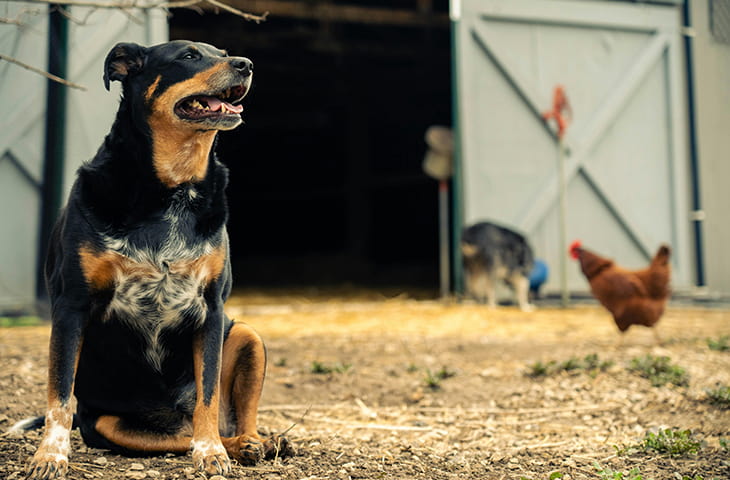Is This Groundbreaking Cure The Key To Beating Parvo?

01.07 BW Lead
https://www.barkandwhiskers.com/2018-07-27-nl-fmt-helping-dogs-survive-parvo/
https://www.barkandwhiskers.com/p/6adcb3a8-ced3-473a-9153-0e3e5ad64376/
By Dr. Karen Shaw Becker
For all of us who love dogs, the fear of parvo is real, because it’s a deadly, difficult to treat and highly contagious disease. Canine parvovirus type 2, or CPV-2, is an infection that attacks the gastrointestinal (GI) tract of both domesticated and wild puppies and adult dogs. The virus damages intestinal crypt cells, which results in increased gut permeability and profuse, bloody diarrhea.
In addition to the GI effects of parvo, in very young and unborn puppies, the virus can damage the heart muscle as well. Parvo is passed by direct dog-to-dog contact and contact with infected feces, environments and people. The virus can contaminate everything a dog touches: food and water bowls, collars and leashes — even the humans who handle the dog and their clothing.
Parvo also happens to be a very resilient virus that can survive extremes in temperature and humidity levels. It lives in the environment for long periods of time. Even tiny amounts of parvo-infected stool can contaminate an area and transmit the disease to other dogs entering the area. Parvo can be easily spread from one location to another on a dog's hair or feet, on a contaminated pet carrier and on shoes and other objects.
Symptoms of Parvo and Traditional Treatment Options
Parvo causes similar symptoms in all infected puppies and dogs, including:
- Vomiting
- Severe and often bloody diarrhea
- Lethargy
- Fever
- Loss of appetite
In dogs infected with the virus, dehydration is a constant concern and can occur very quickly as a result of the vomiting and diarrhea. This is especially dangerous in very young puppies.
Most deaths from parvo occur within 48 to 72 hours after the onset of symptoms, which is why it's critical that you take your dog to a veterinarian or emergency animal hospital immediately if he shows any signs of the infection. And since the disease is so contagious, affected dogs must be isolated to minimize spread of infection.
There is no specific antiviral therapy for parvo. Treatment of an infected dog is typically supportive in nature, including replacing fluids and electrolytes, controlling vomiting and diarrhea, and preventing secondary infections. The goal is to successfully support the dog’s organs and body systems until the immune response can conquer the infection.
Fortunately, a procedure known as a fecal transplant, also called microbiome restorative therapy or fecal microbiota transplantation (FMT), is showing promise in helping dogs survive parvo. I have used FMT for many patients dealing with severe gastrointestinal infections and chronic conditions over the last five years with incredible success. You can learn about one of my patients here: Felix's story.
FMT, which is also referred to as a fecal transplant or microbiome restorative therapy (MRT), describes an ancient practice many cultures around the world have used to effectively treat outbreaks of potentially life-threatening gastrointestinal infections. FMT simply replaces unhealthy or infected microbiomes in diseased humans with healthy ones.
FMT is also being used in top human hospitals around the world to help people recover from C. Diff infections and other ravaging GI disorders, with impressive success.1
FMT Significantly Improved Survival Rates and Recovery Time in Puppies With Parvo
Researchers at two veterinary teaching hospitals in Brazil conducted a study that ran from July 2015 through August 2016 to evaluate the safety and effectiveness of FMT in a group of 66 puppies diagnosed with parvovirus.2 The pups were under 1 year of age and suffering from acute hemorrhagic diarrhea syndrome (profuse bloody diarrhea).
Upon admittance to the hospital, the researchers performed bloodwork, fecal exams and parvo testing on all the puppies, and each pup received a physical exam daily while hospitalized. Half the patients received standard supportive treatment for parvo (IV fluids, antimicrobials, plus anti-nausea and gastric protectant medications). The other 33 puppies received the standard supportive treatment protocol plus FMT.
The feces donor was a healthy adult American pit bull terrier whose poop was collected daily for two weeks and frozen. The transplantation dose for each pup was 10 grams of feces blended with 10 milliliters of dilute saline. The doses were given in the rectum using a syringe and catheter, and the pups had to remain lying on their left side with their pelvis elevated for two minutes following administration.
The puppies who received FMT weren’t restrained, sedated or anesthetized for the procedure, which was performed six to 12 hours after hospital admission, and then every 48 hours until the diarrhea resolved or they had undergone five transplantations. The study results were extremely encouraging:
- Puppies who received FMT had a lower death rate (21.2 percent versus 36.5 percent in the group that received only standard supportive care)
- Diarrhea resolved within 48 hours in 61.5 percent of puppies who received FMT versus only 4.8 percent of pups who received the standard treatment
- Average hospitalization time was much shorter for puppies who received FMT (3.3 days versus six days)
The study authors concluded that FMT is a safe procedure with no adverse effects, and that it decreases the mortality rate and recovery time in puppies with parvo. If, God forbid, your puppy or dog develops parvo, I encourage you to ask your veterinarian about fecal transplants. You might also try contacting an integrative or holistic veterinarian in your area.
FMT isn't a widely used treatment yet, though it’s proving effective for a wide range of GI and other health issues in pets, and there isn’t much research for vets to refer to, but fortunately there are a few practitioners out there blazing a trail for other veterinarians interested in giving this natural, common sense, nearly free therapy the attention it deserves.
Protecting Your Dog From Parvo Through Proper Vaccination
Since many puppies and dogs who develop parvo aren’t able to survive the infection, it’s important to do everything possible to prevent it from happening in the first place. The parvovirus is nothing to fool around with. It’s very much alive and thriving in our environment, and it frequently ends the lives of dogs who become infected.
Over-vaccination is an ongoing problem in the veterinary community, but in my professional opinion, providing baseline protection (usually two well-timed puppy vaccines) against parvo provides your dog with lifetime immunity — and provides you with peace of mind. I have seen far too many puppies acquire parvo unnecessarily in my career to not recommend this basic, highly effective strategy against a potentially fatal virus.
The protocol I follow in vaccinating puppies against parvo (the vaccine protects against all strains) is a parvo/distemper shot before 12 weeks of age (ideally at 9 weeks), and a second round between 15 and 16 weeks. Two weeks after the second round, I titer to insure the dog has been immunized and not just vaccinated. This is a core vaccine protocol that provides the basic minimum number of vaccines to protect against life-threatening illnesses, without over vaccinating.
Since the job of vaccines is to stimulate antibody production, if a puppy is exposed to parvo (or another virus for which he's been vaccinated), he has some level of circulating protection. Vaccines stimulate antibody production, but it takes 10 to 14 days after the vaccination for adequate protection to occur.
A small percentage of dogs known as "non-responders" will not develop immunity and will remain susceptible to parvo for a lifetime. This is very important information for dog owners to have, which is another reason I titer after the second round of shots.
In addition, some puppies retain a level of immunity from their mother's milk that interferes with the effectiveness of vaccines. Titering gives us the information we need to be confident the pup has been immunized effectively, or if he hasn't, to determine why, and what further action should be taken. I also always provide a homeopathic detox agent for newly vaccinated animals.
Comments (8)


